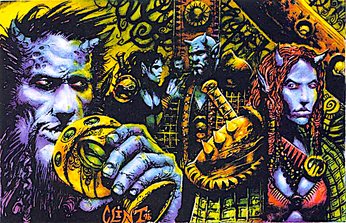A Lodge is a Freehold held primarily by Trolls.
Overview[]
Trolls prefer to gather among their own. Any freehold held primarily by them is called a lodge and will reflect their proportions. This is not a matter of prejudice but of comfort; few smaller fae feel at home in an environment that makes them feel no larger than a child. Though not an intentional by-product, few trolls bemoan this effect overly much.
Whether noble or common, all lodges have a clannish, almost tribal feel that hearkens back to the great halls of the Danes and Norsemen, which were based on this fae ideal. Rule and order are maintained in a combination of the accepted feudal model and a more democratic one. These ideas sound disparate but the trolls make it work. If anything, the feudal aspect is more recent. Before the rise of nobles, all decisions within troll society were made by a collusion of the fellowships.
Before the Shattering, each lodge was truly a familial affair, and Byzantine links of kinship and marriage connected all who lived there. Since then, though, kinship by blood is a happy exception, not the rule. Instead a more general feeling of camaraderie born of shared heritage has developed. It is a testament to the desire for family, though, that adoption by one of higher rank is not uncommon and is seen as one of the greatest honors a troll can earn. Nobility and title are for and from society at large, whereas family is a private and more meaningful matter. Not surprisingly there is even an Oath of Adoption that they use for such matters.
Fellowships[]
Fellowships form the three-part foundation of every troll Lodge. See the larger article Fellowship (CTD) for more information
Noble Lodges[]

Like all noble freeholds, noble lodges are ruled by the reigning aristocrat and have all the trapping of the feudal model. Typically a baron or baroness will hold the freehold with the assistance of knights, chamberlains, and the like, but he or she is still bound by tradition and respect to work with the Fellowships. Unlike the nobility of other kith, titles are not considered hereditary among trolls. Instead, the rulership of vassals is tied strongly to performance, as judged by the fellowships. If there is sufficient displeasure at the rule of a given noble, the fellowships may meet and decide to remove the offender. Only rarely do the ousted nobles resort to violence in the face of opposition, and even then there is no record of fatality from these insurrections. This is the result of pragmatism and honor. If a noble cannot gain the support of their people, they have little chance of imposing their will on them without calling in outside help. Few fae are so foolish as to meddle in the internal bickering of trolls, preferring to watch instead from a safe distance.
Motley Lodges[]

Commoner freeholds are also called lodges and are governed by the fellowships. The ruling figure of such a lodge is the chieftain. Since this position is not sanctioned by the sidhe nobility, they are held by a variety of other methods. Even among the Unseelie, the most popular method is by popular decree. Though this may sound at first like a mob-run popularity contest, that is far from the truth. A leader must have the respect of all the fellowships, and must therefore excel in (or at least pay convincing lip service to) domestic, military, and spiritual matters. Not surprisingly, such chieftains are by far the most stable form of government within the number of troll motleys, and also the most numerous.
The other options of attaining chieftainship are brute force or guile. To be able to take control of a collection of these fae known for their size and strength by force alone is no mean feat, nor a common one. Dueling and trial by combat are both respected traditions among all fae, yet they are shaky foundations on which to base a rulership. If the path of violence were seen as both an easy and honorable route to success, as has been the case in the past, then the political situation could easily descend into nothing more than an endless series of challenges and usurpation. This unstable turn of events in the past has led the fellowships to adopt a wait-and-see policy in regards to a strength-based despot; should they prove to be a capable and respectable leader, the will follow willingly. Should they prove otherwise, though, actions may result in their forced removal.
Rule by guile is a difficult route in troll society as they are staunchly unimpressed with duplicitous speech. They feel that the courts of the sidhe are the rightful domain of such, and that they should be free from it within the walls of their own lodges. Consequently, those who rule by guile must be extremely subtle and crafty, both attributes not regularly associated with trolls. Many would-be schemers find themselves undone by their fellows. Though most trolls are reluctant to stoop to the level of lies and innuendo, they have become quite adept at recognizing their use in others. no one likes being manipulated, especially trolls.
Troll Terms of Governance[]
Thought there are as many different lodges as there are trolls that dwell in them, there are certain inescapable structural similarities. Below are a list of noble titles and their motley equivalents.
- Baron (or higher title) is synonymous with the position of Chieftain.
- Knights and Thanes are both the warriors who support the order of the lodge, noble or common.
- Stewards and Seers are synonymous to Chamberlains and Shamans who both hold similar positions within their lodges (advisors), but their actual duties (aside from offering advice) are more domestic and spiritual, respectively.
References[]
- CTD. Kithbook: Trolls, pp. 39-41.
